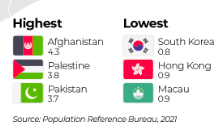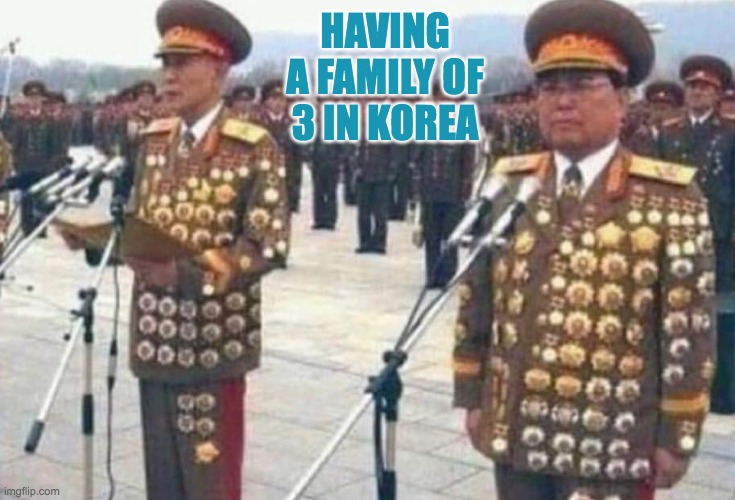A line has stuck with me recently that I felt the need to explore:
By 2100, at the current pace, all but 5% of South Koreans will be extinct
Yes. Like a bird in the Amazon. Gone. We’ve recently posted about a wave of depression that is encompassing South Korean young adults here–> Take me to that article!

Figures released early this year show it fertility fell by another 8% in 2023 to 0.72. It is now even lower if we zoom in on the capital in Seoul.
A ‘national emergency’
Every single developed country are seeing birth rates fall, but none in such an extreme way as South Korea–which is obviously straining their whole way of life. As a way to compensate, the government have tried some potential solutions.
Couples who have children are showered with cash, tax incentives, monthly handouts to subsidized housing and free taxis. For married couples, hospital bills and even IVF treatments are covered. Interestingly, such financial incentives have not worked, leading politicians to brainstorm more “creative” solutions, like hiring nannies from South East Asia and paying them below minimum wage, and exempting men from serving in the military if they have three children before turning 30. Nothing is working.
Economically, the high cost of living, energy cost increases, unaffordable housing, the geopolitical uncertainty, trade deficit for the 2nd year in a row, reduced imports and exports & weakening domestic demand (partly due to the shrinking population) has lead couples to say that they will never afford children.
Culturally, ones’ face, or status in a wickedly competitive society does not value children near as much as it does getting into a great university and working for one of the big companies. The hunt to achieve is so immense that having children almost guarantees that you’ll become a failure with respect to your peers and elders. This missing the forest for the trees phenomenon has lead South Korean demographics to fall precipitously.
The Flipping Iron Curtain
Women have even recently protested that due to cultural barriers between men and women (4B movement) has thrown another curveball into the mix. The movement is a feminist movement which has gained traction who aim for the refusal of (heterosexual) marriage, childbirth, romance, and sexual relationships & envision a Barbie type world.
In their defence, domestic violence in relationships are not unheard of throughout a relationship or when a woman wishes to end a relationship. For those who are less ideologically possessed, let’s say average women, have found it very difficult to convince a man to have a long-term relationship as well. Men, allegedly, elect to climb the corporate latter now, rather than aim for the long-term future with a family later. It simply doesn’t serve any meaningful purpose for ones status within the culture of trying to beat the hard economic times to succeed.
Anecdotally, I can say that many Koreans who moved to Mexico have been shocked by the numbers of young families and the level of individual freedom completely separated from their social & work status in society. Additionally, many accounts from Koreans talk about how they are now going “woke” and adopting far-leftist ideas that are different but end up to the same place as their Northern neighbour.

In offering jobs, there is very often a mismatch between employers, who want to hire somebody quickly but fire them at will, and employees, who want a job with some sense of security, including at least the payment of the so-called “Four Major Insurances” (employment, industrial accident compensation, national pension, and national health insurance). In 2021, about 42% of employees were deemed “irregular”, meaning they were temporary, part-time or atypical workers, according to the Korea Economist Institute of America, most not covered by the Four Major Insurances.
This relates to another article of ours which is WHY THE MINIMUM WAGE SHOULD BE ABOLISHED however some employers are doing their part:
South Korean Firms to Pay Employees Up to $75,000 USD in Child Bonuses
To combat a dwindling birth rate, companies like Booyoung Group (construction company) and Sangbangwool (underwear company) are stepping up with substantial financial bonuses to encourage employees to start families. These are the first two companies who are acknowledging the fertility problem. The CEO of Sandbangwool saying, “A low birth rate is an important task for our society to overcome. The company will take responsibility and put all-out efforts to help the country increase the fertility rate.”
Create a Business?
Aside from the wicked bureaucracy & many taxes one may face, the reality is that many South Koreans may not have the capital to launch their own business and it’s not favourable in society to walk your own line. As a collectivistic culture, independent app developers or businessmen are fewer than in the West. Moreover, the business culture is somewhat resembling of a family whereby every member is thought to adopt many benefits that far extend beyond salary. The culture is something like “I won’t ever quit, but you pay my healthcare forever”. While it may be good for employees, it’s once again difficult to conjure enough capital to go against the grain and create a “family” in business, especially if you can’t afford one at home.
If you enjoy this and our other content, please consider sharing. If you don’t have time to share, surely you have time to send in your email to receive news updates & business ideas! Thank you
Geopolitically
The Europeans were not the only ones to sanction Russian oil, South Korea had done the same. South Korea has largely replaced Russian crude oil with increased imports from Saudi Arabia, Qatar and the United Arab Emirates as well as Australia and Malaysia increase in exports of LNG.
Further evidence of US control is seen when we view the US’s paradoxically named The Inflation Reduction Act (IRA). It has been a point of contention with South Korea. As part of the new spending for US Electric Vehicle (EV) and EV battery manufacturing, as well as shift supply chains of critical minerals out of China, the legislation contains provisions that discriminate against South Korean firms, forcing these firms to invest more in the United States than in the European Union or any other country under the law. South Korea have little repercussions to refuse such deal given their waining exports as it stands. South Korea investments in China are also in a precarious position amid US export controls which is especially problematic considering that many of the materials needed for EV batteries originate from China.
As further evidence to show how South Korea are feeling the effects of a weakening economy, they are taking action to make sure their own stock markets do not blow up. Recently they made headlines by doing the unthinkable–ban short selling. How healthy can their economy be when it’s illegal to bet against it?

Closing
South Korea is stuck in a doom loop that is fuelled by their own rigid culture. Men and women increasingly view each other as foes, the economy is suffering due to global recessionary signals, the average person is struggling let alone get ahead and elements of neo-marxist ideologies are for the first time seeping South from the North. Perhaps the most interesting part however is the fertility rates that shows if nothing else changes (for the bad) than South Koreans will literally head towards extinction. It’s a hell of a track to be on.
We’re launching a 7-part series showing you how bad the fertility problem really is… Please grab our Newsletter & consider subscribing
If you’re interested in the culture situation in South Korea, below is a great video. Competitiveness, few options, cultural collectivism and intense regard for university are all covered here–> it’s bleak.
#StayOnTheBall


